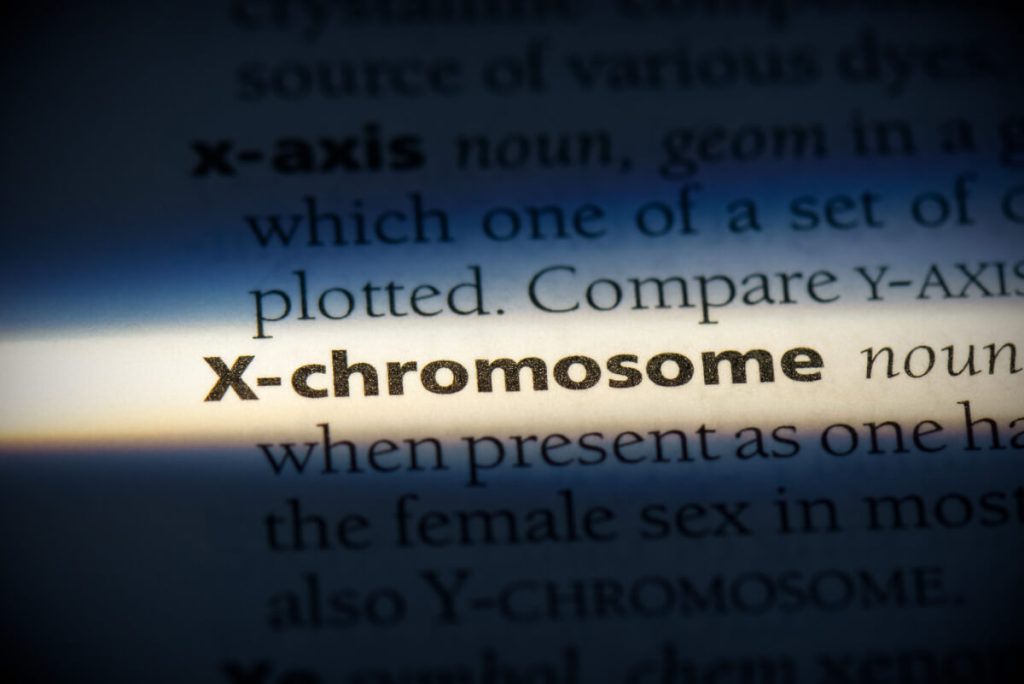

Using only the mother’s X chromosome may speed up brain aging in mice. (Casimiro PT/Shutterstock)
In a nutshell
- Female cells randomly use either the maternal or paternal X chromosome—this study shows that relying more heavily on mom’s X chromosome could speed up brain aging and memory decline
- The effect appears specific to brain function – other body systems like heart, bones, and metabolism weren’t impacted by which X chromosome was active
- Using CRISPR gene editing to activate silenced genes on the maternal X chromosome improved memory in aging mice, suggesting potential therapeutic approaches for maintaining cognitive function
SAN FRANCISCO — A genetic coin toss that happens before birth might influence how women’s brains age decades later. A study from the University of California San Francisco reveals that women’s cognitive abilities and brain aging may be influenced by whether they’re primarily using the X chromosome inherited from their mother or their father.
Biological females have two X chromosomes while males have an X and a Y. In each female cell, one X chromosome randomly becomes inactive during embryonic development. This creates a mosaic pattern where some cells use the maternal X chromosome (Xm) while others use the paternal X (Xp).
The research, published in Nature, was conducted by breeding female mice to express either only maternal X chromosomes or a mixture of maternal and paternal X chromosomes. These variations occur naturally in humans too.
“Skewing of the X chromosome is common among humans, and there are certainly women who are walking around with much higher or lower levels of maternal X chromosomes than others, just by chance,” says senior study author Dr. Dena Dubal, professor of neurology at UCSF, in a statement.


Previous research has hinted at the X chromosome’s vital role in brain health. Mutations in the X chromosome often cause intellectual disability, and women born with just one X chromosome (a condition known as Turner Syndrome) can have cognitive impairments. Some researchers hypothesize that X chromosomes could help explain sex differences in cognition, verbal memory, or brain disease risk.
“Given the fact that the X chromosome is enriched for brain-related genes, it became very important for us to know what roles it might be playing in brain aging,” says study author Samira Abdulai-Saiku, Ph.D., a UCSF postdoctoral fellow.
To test memory and learning abilities, the researchers put the mice through a series of spatial challenges. One key test was the Morris water maze, where mice must remember the location of a hidden platform in a pool. While young mice from both groups performed similarly at first, those with only maternal X chromosomes showed increasingly poor memory as they aged. By their elder years, these mice had significant trouble remembering where things were located and navigating familiar spaces.
The scientists also tested other body functions including heart health, bone density, metabolism, and overall body composition. Surprisingly, they found no differences between the groups in these areas. The effect of having only maternal X chromosomes appeared specific to brain function.


Looking deeper into the brain cells themselves, the researchers discovered that neurons primarily using the maternal X chromosome showed signs of accelerated biological aging compared to those using the paternal X. Through detailed genetic analysis, they identified nine genes that were completely silenced on maternal X chromosomes but active on paternal ones.
Using CRISPR gene editing technology, the research team activated three of these silenced genes in the brains of aging female mice. The result? The mice showed improved cognitive performance, suggesting that these silenced genes play important roles in maintaining brain function during aging.
“These findings raise the possibility that some women who express more of their mom’s X chromosome just by pure chance may have more cognitive impairment with aging or an increased risk for diseases like Alzheimer’s,” says Dubal.
This could potentially explain variations in brain aging not only between women but also between the sexes since males inherit only a maternal X chromosome. While the study wasn’t designed to determine why the maternal X chromosome would accelerate brain aging compared to the paternal X chromosome, the researchers have an intriguing hypothesis. The genes silenced on the maternal chromosome might actually provide advantages earlier in life.
“It may be that this gene expression pattern is actually really beneficial to brain development, but then there is this tradeoff later in life,” explains Dubal.
The research opens up new possibilities for understanding and potentially treating age-related cognitive decline. The team plans to continue studying the role of the X chromosome in brain aging and whether it can explain people’s risk of brain diseases or memory loss.
“The X chromosome you inherited from your mom is turning off genes, accelerating aging, and impairing cognition,” says Dubal. “Can we reverse this?”
This research represents a significant step forward in understanding how genetic inheritance affects brain aging. The source of our X chromosomes might influence cognitive health throughout life, potentially leading to new therapeutic strategies for maintaining brain function as we age.
Paper Summary
Methodology
The researchers engineered female mice by deleting the Xist gene, causing cells to express only the maternal X chromosome. These mice were compared to normal females with mixed X chromosome expression. The mice underwent multiple behavioral tests including the Morris water maze, elevated plus maze, open field tests, and Y-maze tasks to assess spatial memory and learning. They also conducted comprehensive physiological testing including cardiac ultrasounds, bone density scans, and metabolic measurements. Advanced techniques like RNA sequencing and epigenetic analysis were used to study gene expression patterns in individual neurons.
Results
Mice expressing primarily maternal X chromosomes showed progressive memory decline with age, despite normal performance when young. This effect was specific to cognitive function, with no differences in other physiological measures. The researchers identified nine genes silenced on the maternal X chromosome and demonstrated that reactivating three of them (Sash3, Tlr7, and Cysltr1) could improve cognitive performance in aging mice. Importantly, the maternal X chromosome accelerated biological aging specifically in the hippocampus – a brain region crucial for learning and memory.
Limitations
While conducted in mice, findings may not translate directly to humans. The genetic engineering approach used doesn’t perfectly mirror natural variations in X chromosome activation patterns. The study focused only on female mice and primarily measured spatial memory and learning, so effects on other cognitive functions remain unknown. The sample sizes, while appropriate for mouse studies, were relatively small (typically 10-18 mice per group).
Takeaways and Discussion
This study reveals that maternal X chromosome expression can accelerate cognitive aging in female mice, potentially explaining some variations in cognitive aging among women. The successful use of gene editing to improve cognitive performance by reactivating specific silenced genes points to possible therapeutic strategies. The findings highlight the importance of X chromosome regulation in brain aging and cognitive function.
Funding and Disclosures
The research was supported by National Institute on Aging grants RF1AG079176 and RF1AG068325, the American Federation for Aging Research, the Bakar Aging Research Institute, and the Simons Foundation (grants 1018027 and 811225SPI). The lead author serves on the board of the Glenn Medical Foundation and has consulted for Unity Biotechnology and SV Health Investors, though these relationships were unrelated to the study.
Publication Information
The study, “The maternal X chromosome affects cognition and brain ageing in female mice,” was published in Nature in February 2025. The research was conducted at the University of California San Francisco’s Department of Neurology, Weill Institute for Neurosciences, and Bakar Aging Research Institute.








